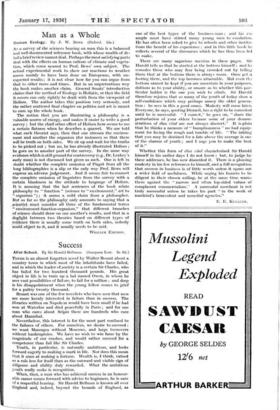Success
After School. By Sir Harold Ber.man. (Sampson Low. 3s. 6d.)
THERE is an almost forgotten novel by Walter Besant about a country town in which most of the inhabitants have failed, and in which the leader of .society is a certain Sir Charles, who has failed for two hundred thousand pounds. His great object in life is to train up a lad named Owen, in whom he sees vast possibilities of failure, to fail for a million ; and deep is his disappointment when the young fellow comes to grief for a paltry twenty thousand.
Besant was one of the few novelists who have seen that men are more keenly interested in failure than in success. The libraries written on Napoleon would have been small if he had won at Waterloo and died peacefully in Paris ; and for one man who cares about Scipio there are hundreds who care about Hannibal.
Nevertheless, this interest is for the most part confined to the failures of others. For ourselves, we desire to succeed : we want Marengos without Moscows, and large turnovers without bankruptcies. We have no wish to win fame by the magnitude of our crashes, and would rather succeed- for a competence than fail like Sir Charles.
Youth, in particular, is naturally ambitious, and looks forward eagerly to making a mark in life. Nor does this mean that it aims at making a fOrtune. Wealth is, I think, valued as a rule less for itself than as the outward and visible sign of diligence and ability duly rewarded. What the ambitious youth really seeks is recognition.
When, then, a man who has achieved success in an honour- able career comes forward with advice to beginners, he is sure of a respectful hearing. Sir Harold Hellman is known all over England and, indeed, beyond the bounds of England, as one of the best types of the business-man ; and his ex- ample must have stirred many young men to emulation. He has often been asked to give to schools and other institu- tions the benefit of his experience ; and in this little book he collects several of the discourses which he has thus been led to make.
There are many sagacious maxims in these pages. Sir Harold tells us that he started at the bottom himself ; and he consoles those who may fear being crowded out by telling them that at the bottom there is always room. Once get a footing there, and the top becomes attainable. But even the bottom cannot be kept if you are uncertain in your purposes, dubious as to your ability, or unsure as to whether this par- ticular ladder is the one you wish to climb. Sir Harold therefore rejoices that so many of the youth of today show self-confidence which may perhaps annoy the older genera- tion : he sees in this a good omen. Modesty will come later. Everyone, he says, quoting Disraeli, has a right to be conceited .until he is successful. " I cannot," he goes on, " share the perturbation of your elders because some of your demon- strations of elan vital are not always discreet." It is plain that he thinks a measure of " bunmtionsness " no bad equip- ment for facing the rough and tumble of life. " The inkling that you may be destined for a fate above the average is one of the charms of youth ; and I urge you to make the best of it."
Whether this form of élan rind characterised Sir Harold himself in his earlier days I do not know ; but, to judge by these addresses, he has now discarded it. There is a pleasing modesty in his few references to himself, and a full recognition that success in business is of little worth unless it opens out a wider field of usefulness. While urging his hearers to be diligent in their chosen calling, he at the same time. warns them against the " narrow and often lop,sidod values of :complacent commercialism." A successful merchant is not truly successful unless he takes his part " in the work of mankind's benevolent and remedial agencies."
E. E. Ii.r.m.rrT.






































 Previous page
Previous page